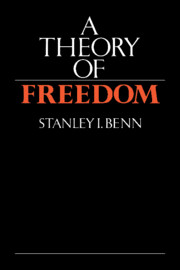Book contents
- Frontmatter
- Contents
- Foreword
- Preface
- Acknowledgments
- 1 Persons and values
- 2 Practical rationality and commitment
- 3 Reasons in conflict: Quandaries and consistency
- 4 Values and objectivity
- 5 Natural personality and moral personality
- 6 The principle of respect for persons
- 7 Freedom of action
- 8 Freedom as autarchy
- 9 Autonomy and positive freedom
- 10 Autonomy, integration, and self-development
- 11 Self-realization, instinctual freedom, and autonomy
- 12 Autonomy, association, and community
- 13 Human rights and moral responsibility
- 14 The principle of privacy
- 15 Interests in privacy
- 16 Conclusion: A semantic theory of freedom
- Notes
- Index
4 - Values and objectivity
Published online by Cambridge University Press: 04 December 2009
- Frontmatter
- Contents
- Foreword
- Preface
- Acknowledgments
- 1 Persons and values
- 2 Practical rationality and commitment
- 3 Reasons in conflict: Quandaries and consistency
- 4 Values and objectivity
- 5 Natural personality and moral personality
- 6 The principle of respect for persons
- 7 Freedom of action
- 8 Freedom as autarchy
- 9 Autonomy and positive freedom
- 10 Autonomy, integration, and self-development
- 11 Self-realization, instinctual freedom, and autonomy
- 12 Autonomy, association, and community
- 13 Human rights and moral responsibility
- 14 The principle of privacy
- 15 Interests in privacy
- 16 Conclusion: A semantic theory of freedom
- Notes
- Index
Summary
On valuing
“Value” is a philosopher's abstraction. Though in everyday conversation we commonly talk about “setting a high value upon” or “giving good value for” something, we rarely have occasion to talk about “a value” as such, and if we speak of a person's “values,” we are borrowing rather self-consciously from the kind of quasitechnical vocabulary that philosophers have constructed for talking about problems in moral philosophy, rather than about moral problems. It is the verb to value that seems basic. “He values your friendship,” “She values that picture more than life itself” are pretty unproblematic. So if the verb is more at home than the abstract noun in the language of practice, it may be more profitable, even for philosophical purposes, to begin with the verb. This has the further advantage that we may be less tempted to look around in the noumenal world for esoteric, “nonnatural” properties to correspond with those abstract “values.” J. L. Mackie convincingly argued (for those that needed convincing) that, supposing such properties to be primary qualities of objects, in that sense “objective” and quite unrelated to the perceptual and cognitive modes of valuers, they would have to be not merely strange but impossibly elusive.
I take it that to value some X is to prefer any state of affairs S of which X is a feature, to any state S′ in all other respects similar to S, from which, however, X is absent and to prefer S is to rank S over S′ for the purposes of choice, admiration, commendation, and cherishing.
- Type
- Chapter
- Information
- A Theory of Freedom , pp. 65 - 86Publisher: Cambridge University PressPrint publication year: 1988



